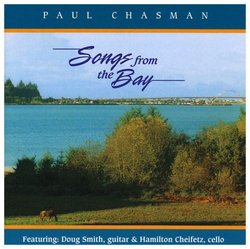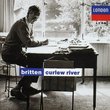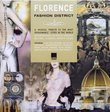| All Artists: Paul Chasman Title: Songs From the Bay Members Wishing: 0 Total Copies: 0 Label: Bay View Music Release Date: 1/1/2000 Genres: Special Interest, Pop Style: Easy Listening Number of Discs: 1 SwapaCD Credits: 1 UPC: 603831000425 |
Search - Paul Chasman :: Songs From the Bay
 | Paul Chasman Songs From the Bay Genres: Special Interest, Pop
|
Larger Image |
CD DetailsSimilar CDs |
CD ReviewsPaul Chasman and Friends Chris Hager | Portland, OR USA | 11/27/2000 (5 out of 5 stars) "Paul Chasman has done it again: He has produced a stunningly beautiful CD of original work, only this time in collaboration with two other stellar artists. Songs from the Bay features Paul on classical guitar, accompanied by Portland guitar virtuoso Doug Smith and cellist Hamilton Cheifetz, the chair of the cello department at Portland State University and a member of the Florestan Trio. The first four pieces comprise the Conversations for Two Guitars, on which Paul is joined by Doug. The last six pieces comprise the Suite for Cello and Guitar: Songs from the Bay, on which Paul is joined by Hamilton. Between the two sections of this CD is Prelude to the Suite, which is the only piece on the CD on which all three musicians play. What struck this listener immediately is the lushness of tone produced by the stereo separation. The effect is mesmerizing. If you've got headphones, use them. If you don't, turn the lights off, lie down on the floor between the speakers, and be prepared to be overcome by the simple grace and elegance of the combination of instruments on this extremely well-recorded CD. The first Conversation is entitled Big Guy Strikes Again, the "Big Guy" being J. S. Bach. Here, the big guy is back with a vengeance: The seven-eight time gives this piece a looseness the big guy himself would have admired. I'm pretty sure Bach stayed away from seven-eight time, but had he ever decided to dabble in it, he would have done well to write a piece as elegant as this. Shimmering, the second Conversation, does indeed shimmer, like light on the wind-blown surface of a reflecting pond - there are 24 time signature changes in the first 28 measures alone. Moreover, trying to pick out the key and tempo is like trying to discern a pattern in the play of light on water's surface: Though the piece is written in the key of E and designated adagio, there are many accidentals and tempo changes here. The overall effect of these vicissitudes is one of liquidity. Here is Debussy's playful sea motif as reflected by Alsea Bay, beside which Paul's home sits. Ancestors is Paul's tribute to his family's musical heritage. Paul's ancestors are from Russia and Germany; however, this piece implies they may have immigrated via side trips to Italy and Greece. Paul must have been trying to please a wide variety of his ancestors, as the flavor here is Mediterranean gavotte/minuet/tarantella bouillabaisse - the piece gracefully and effortlessly glides around time signatures from 6/4, 7/4, 3/8, and 5/4 to, believe it or not, 3/4 and 4/4! This is a lovely piece that would move anyone with an inclination for dance to pirouette around the room. The Great Escape is rush hour for two guitars, allegro con molto caffeine. David Loftus, in his review for the (Portland) Oregonian's A & E Audio Zone (6/16/00), describes this piece as "two guitars dashing at breakneck speed, sometimes in parallel motion, sometimes passing the melodic line back and forth between them, before the sudden relief of four chords and a single unison note." To me, these final notes symbolize Paul's fairly recent move to the Oregon Coast. In Ancient Wonders, Paul conjures up a drippy rain forest, and does the drips particularly well. This piece seems filled to bursting: with anticipation, with growth, with a sense of life. It's an inspiring piece that hints at things to come. The next piece, Mother Ocean, Father Sea, begins with the guitar mimicking the undulations of the ocean, which continues throughout. Two measures later, the cello begins lurking about in the mysterious and murky depths, gradually and continually rising upward until surfacing in measure 33. Here the cello begins to splash around in the shallows, if not playfully at least less ominously, before re-submerging to the depths in measure 63. Overall, though Mother Ocean, Father Sea sounds like a warning to leave well enough alone, it's an irresistible siren's song that begs to be listened to over and over again. I think Majestic Elk begins with solitary cello/elk calls, but gradually the rest of the herd joins in. They can't be seen until they come into view in measure 29 when the guitar supplies the visual scenery, and the listener can finally picture these elk strutting about. The next piece also has an animal motif. Return of the Swallows feels baroque: These swallows must be returning from Renaissance Italy and a visit with Vivaldi. This is a beautiful piece that sounds like a missing section of The Four Seasons. It's one of my favorites on this CD. Alsea Bay wasn't written as a lullaby, but has a dreamy flavor. It wasn't written as a waltz either, but it has a certain lilt. If the listener can't decide whether to sleep or dance, I suggest simply to listen, especially to the way the phrasing bounces from a triplet to a doublet feel - an enchanting effect. In Dog Dance, guess which instrument is Sitka, the sedate and stately Malamute, and which is Clyde, the four-legged proof that the species has no pre-frontal lobe. Take a peek at the photo of Paul and his dogs on the back of his last CD, "Sonatas No. 1 and 2 for Guitar." The picture is a dead give-away. Finally, there's no piece like Home. Of this piece Paul himself says, "There is nowhere I would rather be." The cover photo was taken from his front yard, which makes Paul's sentiment here understandable. This song is full of reverence; it sounds like a prayer."
|

 Track Listings (11) - Disc #1
Track Listings (11) - Disc #1

